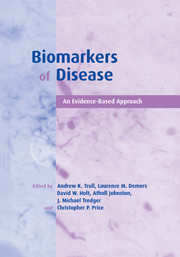Book contents
- Frontmatter
- Contents
- List of contributors
- Preface
- Part 1 Assessing and utilizing the diagnostic or prognostic power of biomarkers
- Part 2 Biomarkers of kidney disease and dysfunction
- Part 3 Biomarkers of bone disease and dysfunction
- Part 4 Biomarkers of liver disease and dysfunction
- 15 Biomarkers of hepatic disease
- 16 The immunogenetics of metabolic liver disease
- 17 Toxicogenetic markers of liver dysfunction
- 18 Prognosis and management of patients with acute liver failure
- 19 Biomarkers in artificial and bioartificial liver support
- 20 Prognostic markers in liver disease
- 21 Apoptosis: biomarkers and the key role of mitochondria
- 22 Liver regeneration: mechanisms and markers
- 23 Determinants of responses to viruses and self in liver disease
- 24 IL-6-type cytokines and signalling in inflammation
- Part 5 Biomarkers of gastrointestinal disease and dysfunction
- Part 6 Biomarkers in toxicology
- Part 7 Biomarkers of cardiovascular disease and dysfunction
- Part 8 Biomarkers of neurological disease and dysfunction
- Part 9 Biomarkers in transplantation
- Index
18 - Prognosis and management of patients with acute liver failure
Published online by Cambridge University Press: 20 August 2009
- Frontmatter
- Contents
- List of contributors
- Preface
- Part 1 Assessing and utilizing the diagnostic or prognostic power of biomarkers
- Part 2 Biomarkers of kidney disease and dysfunction
- Part 3 Biomarkers of bone disease and dysfunction
- Part 4 Biomarkers of liver disease and dysfunction
- 15 Biomarkers of hepatic disease
- 16 The immunogenetics of metabolic liver disease
- 17 Toxicogenetic markers of liver dysfunction
- 18 Prognosis and management of patients with acute liver failure
- 19 Biomarkers in artificial and bioartificial liver support
- 20 Prognostic markers in liver disease
- 21 Apoptosis: biomarkers and the key role of mitochondria
- 22 Liver regeneration: mechanisms and markers
- 23 Determinants of responses to viruses and self in liver disease
- 24 IL-6-type cytokines and signalling in inflammation
- Part 5 Biomarkers of gastrointestinal disease and dysfunction
- Part 6 Biomarkers in toxicology
- Part 7 Biomarkers of cardiovascular disease and dysfunction
- Part 8 Biomarkers of neurological disease and dysfunction
- Part 9 Biomarkers in transplantation
- Index
Summary
Introduction
Acute liver failure (ALF) is a devastating disease with a high fatality rate. The clinical picture closely resembles that of septic shock, with arterial hypotension, increased cardiac output and progressive multiorgan dysfunction. Cerebral oedema and intracranial hypertension are the most common causes of death. The pathophysiology of circulatory instability, multiorgan failure (MOF) and cerebral oedema is not fully understood but seems to be related to a decrease in vascular resistance and oxygen extraction, i.e. tissue metabolism. This chapter first defines ALF and then describes the most important aetiological causes of ALF. The features of ALF are then considered in relation to various prognostic markers and disease management.
Incidence and aetiology
ALF is a rare but dramatic disease that often affects previously healthy and young people. The incidence is ∼8 per million in Denmark and is probably similar in other western countries. Recently, it was estimated that there are 2000 cases of ALF each year in the USA.
The single most common cause of ALF is paracetamol intoxication, accounting for ∼50% of the ALF patients in UK and Denmark and for ∼20% of ALF patients in the USA. Acute viral hepatitis B is the predominant cause of ALF in central and southern Europe, with acute viral hepatitis E a frequent cause of subacute liver failure in India. Other causes of ALF include mushroom intoxication, drug-induced hepatotoxicity (ecstasy, halothane, valproate and disulfiram), autoimmune hepatitis, cardiac failure, and inherited metabolic diseases.
- Type
- Chapter
- Information
- Biomarkers of DiseaseAn Evidence-Based Approach, pp. 199 - 210Publisher: Cambridge University PressPrint publication year: 2002



